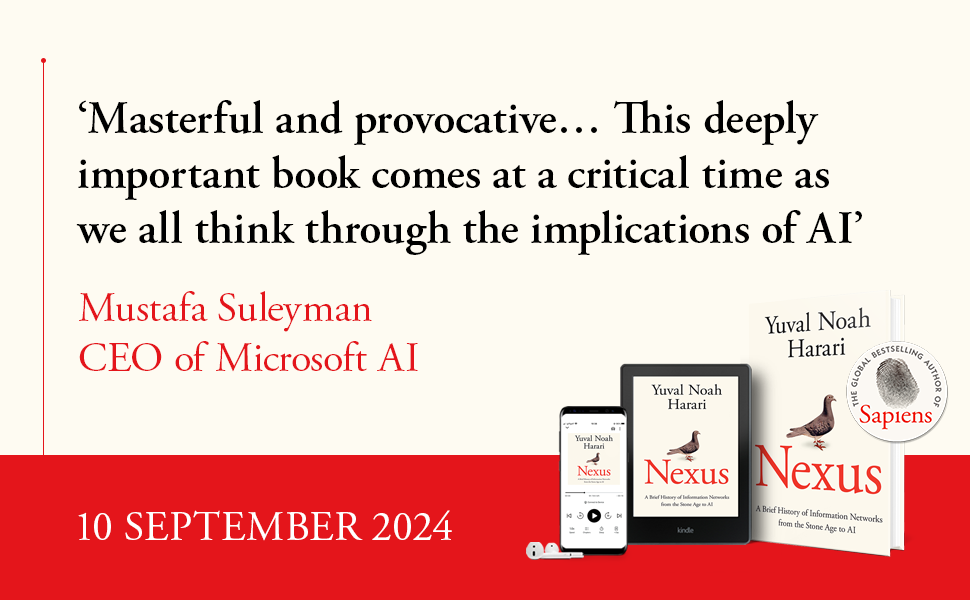





Full description not available




T**R
An essential read... probably
Generally I think I've been keeping up with AI developments. That is, until I hear about and test its next mind-bending ability. At which point I realise I was naive in thinking AI would never get this far.That's where this book comes in.Nexus is partly a history of technologies that convey human thought - from spoken word, stone tablets and books, through to computers, algorithms and AI. Harari has pinned down what was transformational about each technology, how it changed the landscape, and also how it was inevitably misused and exploited by humans. It's a lot of background, which I wasn't sure about at first, but by the end it definitely pays off because of the context provided. The book is very accessible and that does mean some repetition when bridging between stories. If you're new to the field, or are listening to the audiobook, or are dipping in and out, you'll probably appreciate that memory-jogging.It's a very thought-provoking read. I didn't know as much about its historical accounts as its modern ones, and Harari's style is clear and passionate without straying into emotional even if the subject matter is. The book is also thoroughly researched - I say that not only because of the numerous references, but because when Harari discusses topics I do know well (e.g. algorithms and 21st century), I pretty much always find myself in agreement with the text, which is rare for me. That reassurance meant I was able to get through it very quickly (especially the 2nd half).So why do I say "probably" in my review title? Well, if your job is future forecasting and you have some inside view of this tech that means you see it months or years in advance, then it is mainly the number of striking historical parallels that may enrich your view. But in fact I reckon this book's content is near-essential for much of the population, just like how we study and learn from major historical or scientific developments. We are all going to be affected by it more and more, unless you live totally off-grid forever. Is there a greater revolution in this time in history than the technological one(s)? This book says no.Today, you can certainly argue about AI's lack of personality and finesse, its influence in the political spheres and the controversy about the rights of artists and creators it has leveraged/exploited. (I always question now how much of the YouTube video I'm watching was conceived by a human or an AI, and how that affects trust.) But rightly or wrongly, the result is a staggering rate of development 24/7 which can almost be scary. And right now it's still in its infancy.In a nutshell, I'd say get a hold on this topic while it's still manageable. That's what I'm trying to do, and this book deepened my perspective hugely.Received in excellent condition. I wanted a paper copy for quicker reference, though I originally heard the audiobook instead.
P**K
Nexus is a well-researched and engaging read.
"Nexus," is a thought-provoking exploration of the intersection of humanity and technology. It delves into the history of information networks, from ancient civilizations to the digital age, and offers a glimpse into a future dominated by artificial intelligence.Harari's signature style of weaving historical, philosophical, and scientific insights is on full display in "Nexus." He masterfully analyzes the evolution of human society and the role of information in shaping our world. The book challenges readers to consider the potential consequences of unchecked technological advancement, particularly the development of artificial intelligence.While some may find the book's scope ambitious, it offers a unique perspective on humanity's future. Harari's ability to connect seemingly disparate concepts and present complex ideas in an accessible manner is commendable."Nexus" is a valuable contribution to the ongoing conversation about humanity's future and technology's role in shaping our destiny.
S**E
A great, path-clarifying book, just too long
In the end, I enjoyed and learned from Nexus. But I think it is way too long and winding. it could have easily been shortened by at least one-third, if not more. The final message is on the ball, but not much different from the message coming from other shorter) books and articles on infotech and AI.What I liked is the way Harari, an accomplished historian of Western civilisation, creates the frame for bringing the challenge of AI into the broader history starting millennia ago.The example of the printing press not generating only positives -- like the spreading of knowledge and wisdom -- but also negatives -- like with hunts -- is very pertinent.
B**G
brilliant
It took me 4 days to read this book. Captivating. The way Yuval has written this is brilliant. He has communicated the essence of AI and the impact it can potentially have, in a very succinct way. It certainly has me thinking about how I live my life and how I want technology, particularly AI, to influence it. I have loved reading all of his books. Can’t wait for more.
Trustpilot
2 months ago
2 months ago